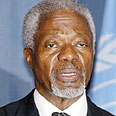 UN Secretary General Kofi Annan called Wednesday for the immediate release of kidnapped Israeli soldiers and condemned Israel
UN Secretary General Kofi Annan called Wednesday for the immediate release of kidnapped Israeli soldiers and condemned Israel
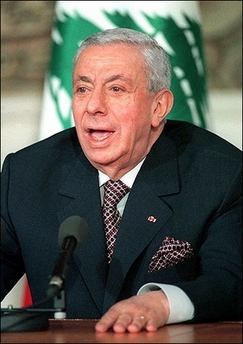 New York Times BEIRUT, Lebanon, July 7 (Agence France-Presse)
New York Times BEIRUT, Lebanon, July 7 (Agence France-Presse)
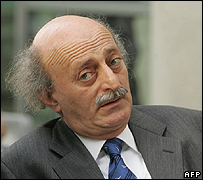 Security officials in Lebanon say that one person has been killed and five wounded in fighting between supporters of rival Druze politicians. The clashes were between supporters of the pro-Syrian former minister, Wiam Wahhab, and the anti-Syrian politician, Walid Jumblatt.
Security officials in Lebanon say that one person has been killed and five wounded in fighting between supporters of rival Druze politicians. The clashes were between supporters of the pro-Syrian former minister, Wiam Wahhab, and the anti-Syrian politician, Walid Jumblatt.
They broke out during a dispute over the display of political posters in the town of Jahliye, south of Beirut. The security forces moved in to stop the fighting. It was not clear which side began the shooting, but acting Interior Minister Ahmed Fatfat said all the casualties appeared to be supporters of Mr Jumblatt.
Tensions, This is not the first clash between the two groups. In April, Mr Wahhab’s bodyguards shot and wounded two civilians who objected to his presence at a funeral in a Druze mountain village. Tensions between supporters and opponents of Syria’s influence in Lebanon have increased since the assassination of the former Lebanese PM Rafiq Hariri, in February 2005.
BEIRUT: Maronite Patriarch Nasrallah Butros Sfeir responded on Thursday to what he described as former Minister Suleiman Franjieh’s "misplaced" verbal attack on a bishop. Sfeir said he regretted Franjieh’s comments and wished the former MP had not made them.
"We know that … Franjieh is the son of the Maronite Church and a citizen of Zghorta, and that he is concerned about the Maronite Church, its children and its respect, so when he attacks a bishop I believe the attack is misplaced," Sfeir said. The prelate’s response came ahead of his departure on a visit to the United States expected to last at least 20 days. During his visit Sfeir is expected to participate in a commemoration of the Maronite Church’s founding in the US 40 years ago.
While the patriarch noted the importance of resolving the issue before it escalated, he stated unequivocally that "a bishop must be respected." On Wednesday, Franjieh accused Bishop Youssef Beshara of having sided with MP Saad Hariri, the leader of the parliamentary majority.
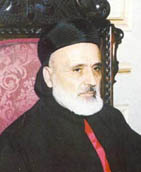 Patriarch of the Maronite Catholic Church to Make Historic Stop in the Greater Boston Area July 12-14, His Beatitude and Eminence Nasrallah Peter Cardinal Sfeir to Visit St. Anthony’s Maronite Church in Lawrence Considered ‘Bridge’ Between Muslim Community and Christians and the West
Patriarch of the Maronite Catholic Church to Make Historic Stop in the Greater Boston Area July 12-14, His Beatitude and Eminence Nasrallah Peter Cardinal Sfeir to Visit St. Anthony’s Maronite Church in Lawrence Considered ‘Bridge’ Between Muslim Community and Christians and the West
Cardinal Sfeir will arrive at Lawrence Airport on the afternoon of July 12, and will celebrate a Pontifical Liturgy at 7:30 p.m. at St. Anthony’s, 145 Amesbury Street, in Lawrence. Cardinal Sfeir will celebrate a second liturgy at 9 a.m. the next morning, followed by a press conference at 11 a.m. A third liturgy will be celebrated at 9 a.m. on Friday, July 14, prior to the Cardinal’s departure. As Patriarch, Cardinal Sfeir is head of the 12-15 million-member Maronite Catholic Church. There are approximately 200 million Eastern Catholics throughout the world. Cardinal Sfeir is the President of the Assembly of all Eastern Catholic Patriarchs.
As Patriarch, Cardinal Sfeir is head of the 12-15 million-member Maronite Catholic Church. There are approximately 200 million Eastern Catholics throughout the world. Cardinal Sfeir is the President of the Assembly of all Eastern Catholic Patriarchs. Cardinal Sfeir also is a central figure in the Catholic Church. He offered the homily during Pope John Paul II’s 25th anniversary Mass and presided over the Mass at St. Peter’s Basilica honoring the deceased Vatican leader.
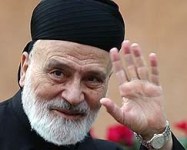 ST. LOUIS POST-DISPATCH, At a meeting with religious leaders Saturday, Lebanese Cardinal Nasrallah Peter Sfeir, patriarch of the Maronite Catholic Church, stressed the need for people of all faiths to help quell global conflict that is often rooted in religious difference."Each of us has a responsibility to look after each other," he said. "We can co-exist in harmony and respect for each other if we keep love in our hearts."
ST. LOUIS POST-DISPATCH, At a meeting with religious leaders Saturday, Lebanese Cardinal Nasrallah Peter Sfeir, patriarch of the Maronite Catholic Church, stressed the need for people of all faiths to help quell global conflict that is often rooted in religious difference."Each of us has a responsibility to look after each other," he said. "We can co-exist in harmony and respect for each other if we keep love in our hearts."
Sfeir spoke to roughly two dozen leaders of various St. Louis faith groups – Mormons, Muslims, Quakers, Roman Catholics – at an interfaith event at St. Raymond’s Maronite Catholic Parish, 931 Lebanon Drive, St. Louis. Sfeir is in St. Louis for a four-day pastoral visit. He will also be stopping in Chicago and New York City.
During his time in St. Louis, Sfeir’s main message was one of hope and peace. At Saturday’s interfaith event, Ghazala Hayat, president of the Interfaith Partnership of Metropolitan St. Louis, asked Sfeir if it was possible to have peace in the Middle East.
"When politics intervenes, it is sometimes hard to see people living together," said Sfeir. "But religion has no material interest. Religion has only God, and if we all pray to God as one, all humanity will be together as brothers."The patriarch is one of the most significant religious figures to visit St. Louis since Pope John Paul II came to the city in 1999.The Maronite Church, an ancient Eastern Rite branch of Catholicism, is based in Lebanon. St. Raymond’s, in St. Louis’ LaSalle Park neighborhood, is the seat of one of two eparchies, or dioceses, of the Maronite Church in the U.S. Sfeir lives in Bkerke, north of Beirut.
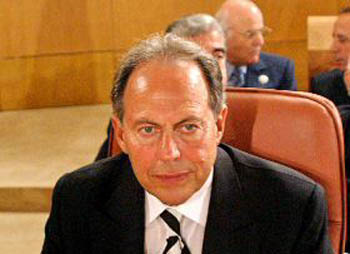 AP, Romania’s decision to invite Lebanon’s prime minister to the Francophone Summit but exclude its president has sparked a diplomatic flap with France, which has supported the snub. It is the third time in 10 months that Lebanon has found its prime minister to be more acceptable at international meetings than its president, who is seen as having been imposed on Lebanon by Syrian influence.
AP, Romania’s decision to invite Lebanon’s prime minister to the Francophone Summit but exclude its president has sparked a diplomatic flap with France, which has supported the snub. It is the third time in 10 months that Lebanon has found its prime minister to be more acceptable at international meetings than its president, who is seen as having been imposed on Lebanon by Syrian influence.
Lebanon will boycott the Francophone Summit, scheduled to be held in Bucharest in September, if its president is not invited, the office of President Emile Lahoud said Wednesday.
"It is really astonishing for the French state to adopt this position," the president’s office said in a statement late Tuesday. "It regrettably confirms the information about direct interference by French President Jacques Chirac." Chirac is known to be at odds with Lahoud and was close to the Lebanese leader’s political rival, former Prime Minister Rafik Hariri, who was assassinated in February last year.
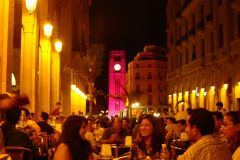 Beirut is shaking off its war- torn past to recreate itself, writes Emma Levine. Beirut drivers have a dreadful reputation, even in the context of the Middle East. For every screech of wheels taking a corner too fast, there are a dozen cases of reckless lane swapping. Crossing the road is a visitor’s main challenge.
Beirut is shaking off its war- torn past to recreate itself, writes Emma Levine. Beirut drivers have a dreadful reputation, even in the context of the Middle East. For every screech of wheels taking a corner too fast, there are a dozen cases of reckless lane swapping. Crossing the road is a visitor’s main challenge.
I am introduced to highway code, Lebanon-style, while squeezed in the back of a taxi with two large women. From the chic designer-boutique area of Verdun, we weave a few kilometers northeast along the Corniche, the Mediterranean promenade, to the central district known as downtown. The ride is a medley of contrasting sights: half-destroyed buildings, their walls peppered with huge bullet holes struggle to stay up; adjacent are their pristine neighbors, the sheen of newly built high-rise towers. Scattered around the area are numerous cranes and building sites. Palm trees fringe the roads in between.
Beirut as a holiday resort might not sound so appealing but this once- popular destination is desperately trying to shake off its war-battered image. A huge rebuilding project, one of the world’s largest, has been transforming the city center, but officials and locals don’t want tourists to have to wait the 20 years it’s likely to complete. The mood is buoyant, hefty investment by wealthy Lebanese expatriates indicates optimism for the future and the number of new hotels, shopping and dining areas is increasing. Beirut is definitely making a welcome return to the tourist map.
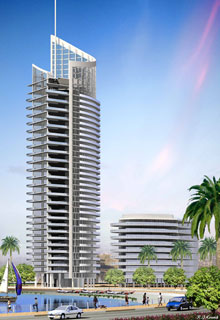 Despite deep economic and political crises, Lebanon is facing an unprecedented property boom, spurred by the appetite of developers, expatriates and Gulf Arabs.The boom started last year despite dramatic events that shook the country, and which turned on the assassination of former premier Rafiq Hariri, with property prices soaring an average of 50 per cent.
Despite deep economic and political crises, Lebanon is facing an unprecedented property boom, spurred by the appetite of developers, expatriates and Gulf Arabs.The boom started last year despite dramatic events that shook the country, and which turned on the assassination of former premier Rafiq Hariri, with property prices soaring an average of 50 per cent.
Beirut has witnessed a major face-lift with the new construction boom, mostly in the once war-ravaged downtown area being rebuilt by the private company Solidere, which runs properties valued at about $5 billion.Brand new residential high-rises financed by Lebanese and Gulf investors now tower over the marina near the seafront road where Hariri was killed in a massive car bombing in February 2005.
"Very often, when the first picks strike the ground at the construction sites, between 75 and 80pc of these projects are already sold to rich Lebanese or Arab nationals," Raja Makarem, manager of Ramco realty, said.Victor Najarian, director general of CARE realty, said "we are managing about 15 projects worth a total value of $1 billion and we hope to double that amount within a year."
by Henri Bou-Saab in Beirut for scoop.co.nz, It is coming up to mid-summer in Lebanon. The coastal cities of Tripoli, Beirut and Sidon are very hot during the daytime and everyone looks forward to the evenings to enjoy social gatherings and their families without the pressure of the heat. For those interested in the development of our democracy and building a stronger society, there is plenty to talk about around the dinner table in the evening breeze.
One is what to do next about our antiquated electoral law. No one can say that citizens have been short-changed in their choice of candidates and political parties in the 79 years since our first parliamentary elections, back in 1927.One is what to do next about our antiquated electoral law. No one can say that citizens have been short-changed in their choice of candidates and political parties in the 79 years since our first parliamentary elections, back in 1927.
We have the oldest secret ballot parliamentary system in the Middle East and one of the common jokes here is that there are 130 parties in the 128-member parliament. Unlike the State of Israel, which forbids most of its people who are Moslem or Christian from voting or even living in their own country and instead leaves them stranded in refugee camps in neighbouring countries, the Republic of Lebanon



